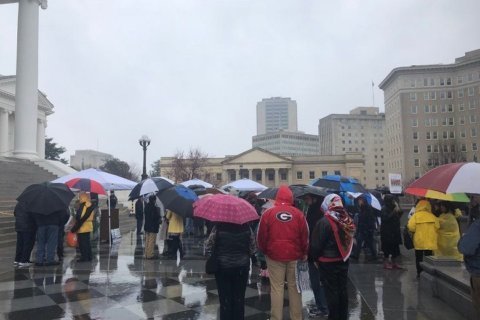Virginia lawmakers return to Richmond on Wednesday for a series of key votes on Gov. Ralph Northam’s vetoes and amendments to bills, ranging from road safety and interstate upgrades, to the budget and elections.
At the one-day reconvened session, often called a “veto session,” the General Assembly can only approve or disapprove of the specific amendments offered by the governor to 29 House bills and 18 Senate bills and attempt to override Northam’s handful of vetoes.
There are unlikely to be many, if any, veto overrides since Republicans control each legislative chamber by only a two vote margin.
Northam, a Democrat, is attempting to restart his role as governor through a few of the vetoes and amendments after an admission during this winter’s short session that he once wore blackface in the 1980s.
Lt. Gov. Justin Fairfax will be back presiding over the Senate. He flatly denied two sexual assault accusations that he describes as consensual encounters before he took office, but remains under pressure, particularly after both of his accusers spoke publicly on CBS This Morning.
In an apparent attempt to capitalize on the return to Richmond, House Republicans released a March 25 letter from Courts of Justice Chairman Del. Rob Bell outlining, for the first time, proposed rules for a potential subcommittee hearing on the accusations against Fairfax.
The letter, addressed to House Minority Leader Del. Eileen Filler Corn, backed off Bell’s statement late in the session that Republicans would call their own hearing into the accusations.
Instead, the letter offered a 10-member subcommittee with five Democrats and five Republicans that would hold a two-day public meeting in June or August for Fairfax and his accusers to testify and provide “other evidence” for up to 90 minutes each.
Additional witnesses could testify on the second day, and some type of online public commentary could be allowed.
It was the first time Republicans had provided the details Democrats demanded before signing on to any committee hearing, but a response from Filler-Corn said that police are best placed to investigate.
The March 31 response from Filler-Corn, also published by House Republicans and confirmed by the House Democratic caucus, said the caucus continues to call on Fairfax to resign over the “extremely serious” allegations. It alleged that any General Assembly committee hearing would be tainted by partisan politics, and could interfere with law enforcement investigations.
“Law enforcement officials are best equipped to investigate these matters, and we certainly would not want to harm their inquiries or deny due process to either the complainants or the Lieutenant Governor by conducting a hearing that could easily be exploited for political purposes,” Filler-Corn wrote.
It is not clear whether there are any active law enforcement investigations.
Concerns from Democrats about any hearing process in an election year for all 140 General Assembly seats “have not been assuaged by continued efforts of the majority,” Filler-Corn said.
In a statement Tuesday afternoon, the House Democratic Caucus said Dr. Tyson’s and Ms. Watson’s bravery in coming forward, and recent interviews that were difficult to watch should not be taken lightly, but that the proposal from Republicans is simply “a politically-motivated and unprecedented spectacle.”
In her letter to Bell, Filler-Corn also highlighted the fact that the General Assembly has not held similar hearings about other criminal accusations against elected officials, even about cases like that of Gov. Bob McDonnell who was accused of crimes within state lines while in office or that of former Del. Joe Morrissey who commuted to the House floor from jail.
“Given the expressed desire of Dr. Tyson and Ms. Watson that they want an opportunity to be heard, we remain open to discussing the option of engaging an independent, third party entity to conduct a hearing while taking into consideration fairness and due process for all involved in a nonpolitical, professional and safe environment in a manner that would not impede or compromise any possible ongoing investigation,” Filler-Corn wrote.
Republican leadership plans to highlight “executive branch controversies” at a Wednesday morning news conference.
Speed cameras could be blocked — and other traffic changes
Northam proposed blocking a bill that would allow the first speed cameras in Virginia.
The bill passed by the General Assembly would permit state troopers to use handheld speed cameras in highway work zones then send citations through the mail.
An amendment offered by Northam calls for more study of the issue. During the reconvened session, lawmakers can only pass or reject the amendments offered by the governor, but cannot offer additional amendments of their own.
Handheld phone ban
Northam has also proposed banning all handheld cellphone use by drivers in Virginia, but House Speaker Kirk Cox has suggested he plans to block that amendment.
A ban on handheld cellphone use behind the wheel, meant to increase safety on the road and reduce distracted driving, had significant support in the General Assembly before it was killed by conference committee changes at the end of the session.
Northam offered the amendments to revive the ban in connection with a separate bill that would only ban handheld cellphone use by drivers in work zones.
I-81 funding would also help elsewhere
After a failed effort to put tolls on Interstate 81, Northam proposed an increase in truck fees and diesel taxes across Virginia to help fund major Interstate 81 improvements and upgrades on other interstates across the state.
About $20 million annually would also be restored to the Northern Virginia Transportation Authority to replace regional money the state instead dedicated to Metro funding last year.
The plan also includes a regional gas tax along the Interstate 81 corridor that would be dedicated to improvements there.
Northam also wants to add language to require a study of ways to reduce tolls for drivers through tunnels in the Hampton Roads area and to allow for changes to toll lanes projects that would permit HOV-2 to ride free rather than only HOV-3 if the road is not being operated under an agreement put in place to build the road.
Budget amendments
Lawmakers are due to vote on 40 budget amendments in total, 13 of which change spending or revenue. The other 27 add direction only.
The changes include whether new online sales tax collections can be delayed, whether that money should be set aside now to give Amazon as part of the HQ2 agreement, $4 million more for affordable housing, and some changes to let Virginia follow through on a promise to restore driver’s licenses to people who lost them simply due to unrelated court fines.
Northam also proposed additional money for census support, the replacement of the dingy Central State Hospital, and additional tax refunds for more lower-income Virginians than provided in a Republican plan approved this winter.
Other changes would restore a proposal to provide long-acting contraceptives to lower-income women, remove a block on regional pollution agreements added by the General Assembly, ensure legislative watchdog access to prison information, and begin an effort to end “balance billing” when patients are charged extra for certain emergency medical services that happen to be out of network.
Northam also offered clarifying language for teacher raises. School systems can get a state match for 3 percent raises July 1, then for up to 2 percent raises that are effective Sept. 1.
Delays in a budget deal between House and Senate leaders forced this winter’s session into overtime.
Other amendments
Northam offered amendments to a bill meant to change the State Board of Elections that would maintain the governor’s control over the body, but allow for some other changes.
The governor also proposed adding foster care placement as a reason for guaranteed paid parental leave for state workers. That is current state policy under an executive order, but the paid parental leave bill for state workers passed by the General Assembly did not include it.
Vetoes
The General Assembly has a number of vetoes to consider, although they’re not likely to succeed in many overrides, given that Republicans have just a two vote edge in each chamber.
Among the vetoed bills are one adding a new category of school protection officers that Northam said was too vague, a bill that would give out-of-state applicants for concealed handgun permits automatic permission if their application is not processed fast enough, several health plan changes, bans on regional pollution agreements and bills related to so-called “sanctuary” policies regarding undocumented immigrants.
Northam also vetoed a bill that would have blocked magistrates from issuing warrants against law enforcement. That bill got significant support in the house of delegates, but passed by a narrower margin in the Senate.
A bill that would ban certain felons from serving as notaries did have veto-proof majorities in both the House and Senate. When he vetoed the bill, Northam said a person who has served his or her sentence has already paid his or her debt to society and should not be permanently disqualified from becoming a notary if his or her civil rights are restored by the governor, since it would limit job opportunities.








